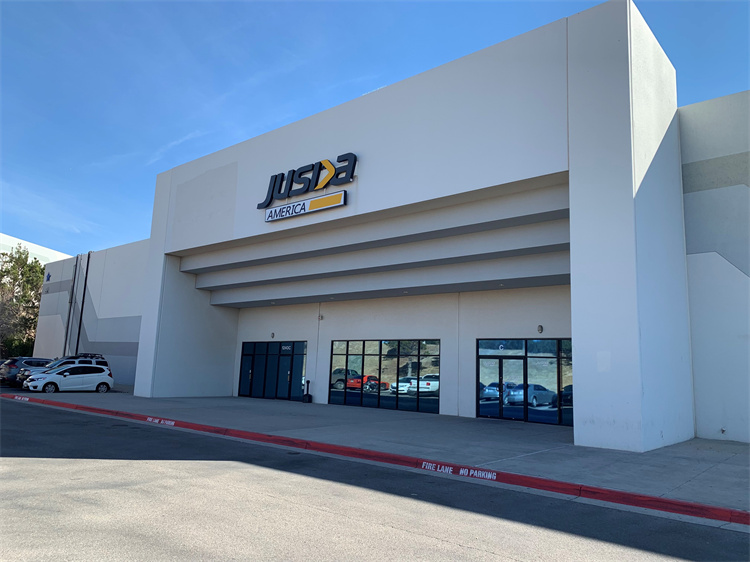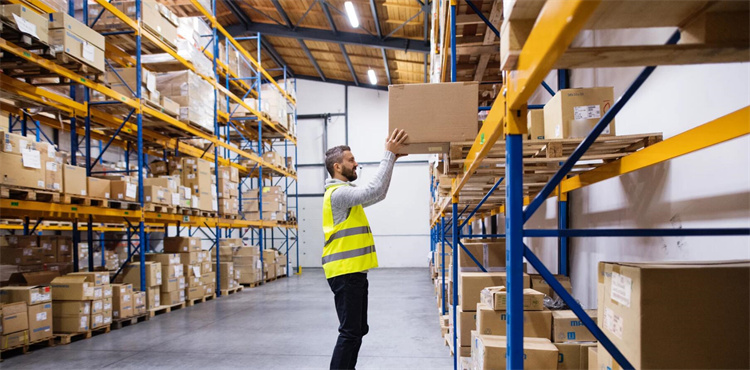Case study to learn how JUSDA leverages technology for supply chain management
JUSDA Logistic Technology stands as a leader in supply chain management. The company excels in enhancing efficiency through streamlined processes and real-time monitoring. JUSDA harnesses data-driven insights to optimize logistics strategies. Technology plays a crucial role in modern supply chain management. It enables companies to respond swiftly to market demands. This case study will explore how JUSDA leverages advanced technologies to achieve operational excellence.

Case study: Overview of JUSDA's Supply Chain Management
Company Background
History and Evolution
JUSDA began as a logistics service provider under Foxconn Technology Group. The company evolved into a leading supply chain technology management platform. Over the years, JUSDA expanded its services globally. The company now operates 155 service points worldwide. JUSDA manages over 2.5 million square meters of warehousing space. The company also runs more than 2,000 international service routes.
Core Services
JUSDA offers comprehensive end-to-end supply chain solutions. The company's services include raw material procurement, manufacturing, and distribution. JUSDA integrates these processes to provide seamless services from factory to end consumer. The company excels in lean supply chain management. JUSDA leverages advanced technologies such as big data, IoT, and cloud platforms. These technologies support complex and variable customer demands.
Supply Chain Challenges
Common Industry Challenges
Supply chain management faces several common challenges. Companies often struggle with inventory management. Delays in transportation can disrupt the entire supply chain. Maintaining real-time visibility remains a significant hurdle. Data accuracy and integration issues frequently arise. Companies also face challenges in demand forecasting.
Specific Challenges Faced by JUSDA
JUSDA encounters unique challenges in supply chain management. The company deals with high volumes of data from various sources. Integrating this data into a cohesive system poses difficulties. JUSDA must maintain real-time visibility across global operations. The company also faces challenges in optimizing resource utilization. Ensuring timely deliveries while minimizing costs remains a constant concern.
Case study: Technological Innovations Implemented by JUSDA

Automation and Robotics
Warehouse Automation
JUSDA Logistic Technology has revolutionized warehouse operations through automation. Automated systems streamline inventory management. Robots handle repetitive tasks with precision. This reduces human error and increases efficiency. Automated guided vehicles (AGVs) transport goods within warehouses. This minimizes manual labor and speeds up processes. The integration of automation ensures optimal space utilization. This leads to significant cost savings.
Robotics in Logistics
Robotics play a crucial role in JUSDA Logistic Technology's logistics operations. Robotic arms sort and pack items quickly. This enhances the speed of order fulfillment. Drones assist in inventory checks and monitoring. This provides real-time data on stock levels. Autonomous vehicles transport goods over long distances. This reduces reliance on human drivers. Robotics improve accuracy and reduce operational costs. This results in faster delivery times and better service quality.
Data Analytics and AI
Predictive Analytics
JUSDA Logistic Technology leverages predictive analytics to forecast demand. Data from various sources is analyzed to predict future trends. This helps in planning inventory levels accurately. Predictive models identify potential disruptions in the supply chain. This allows for proactive measures to mitigate risks. Accurate demand forecasting reduces excess inventory. This leads to cost savings and improved resource utilization.
AI-driven Decision Making
Artificial Intelligence (AI) drives decision-making at JUSDA Logistic Technology. AI algorithms analyze large datasets to provide insights. These insights guide strategic decisions in supply chain management. AI optimizes routing and scheduling of deliveries. This ensures timely and efficient transportation. Machine learning models improve over time with more data. This enhances the accuracy of predictions and decisions. AI-driven solutions lead to better customer satisfaction.
Internet of Things (IoT)
Real-time Tracking
The Internet of Things (IoT) enables real-time tracking of shipments. JUSDA Logistic Technology uses IoT devices to monitor the location of goods. Sensors provide data on the condition of products during transit. This ensures that perishable items remain fresh. Real-time tracking enhances visibility across the supply chain. This allows for quick responses to any issues that arise. Customers receive accurate updates on their orders.
Smart Sensors
Smart sensors play a vital role in JUSDA Logistic Technology's operations. Sensors monitor environmental conditions in warehouses. This includes temperature, humidity, and light levels. Data from sensors ensures optimal storage conditions for products. Sensors also detect any anomalies or potential issues. This allows for immediate corrective actions. Smart sensors contribute to maintaining product quality and safety.
Impact of Technology on JUSDA's Supply Chain

Efficiency Improvements
Time Savings
JUSDA Logistic Technology achieves significant time savings through automation. Automated systems streamline inventory management, reducing the time needed for manual checks. Robots handle repetitive tasks with precision, speeding up operations. Automated guided vehicles (AGVs) transport goods within warehouses efficiently. This minimizes delays and accelerates the overall process.
Cost Reductions
JUSDA Logistic Technology reduces costs by implementing advanced technologies. Automation decreases the need for manual labor, leading to lower labor costs. Efficient resource utilization minimizes waste and optimizes storage space. Predictive analytics help in accurate demand forecasting, reducing excess inventory. These measures contribute to substantial cost savings across the supply chain.
Enhanced Visibility and Transparency
Real-time Data Access
JUSDA Logistic Technology enhances visibility through real-time data access. IoT devices monitor the location and condition of shipments continuously. Sensors provide updates on environmental conditions, ensuring product quality. Real-time tracking allows quick responses to any issues that arise. This level of visibility ensures smooth operations and timely deliveries.
Improved Communication
JUSDA Logistic Technology improves communication across the supply chain. Real-time data sharing enables seamless coordination between different stakeholders. Suppliers, manufacturers, and customers stay informed about the status of shipments. This transparency fosters trust and collaboration. Improved communication leads to better decision-making and efficient problem-solving.
Customer Satisfaction
Faster Delivery Times
JUSDA Logistic Technology ensures faster delivery times through optimized logistics. AI-driven decision-making enhances routing and scheduling efficiency. Autonomous vehicles transport goods over long distances quickly. Real-time tracking provides accurate updates on delivery status. These technologies ensure that customers receive their orders promptly.
Better Service Quality
JUSDA Logistic Technology enhances service quality by leveraging smart sensors. Sensors monitor storage conditions, ensuring optimal product quality. Drones assist in inventory checks, providing accurate stock levels. AI algorithms analyze data to predict potential disruptions, allowing proactive measures. These innovations lead to higher customer satisfaction and loyalty.
Future Directions and Challenges
Emerging Technologies
Blockchain
Blockchain technology offers a promising future for supply chain management. JUSDA Logistic Technology plans to implement blockchain to enhance transparency. Blockchain ensures secure and immutable records of transactions. This technology can track products from origin to destination. Blockchain reduces the risk of fraud and errors in the supply chain. The decentralized nature of blockchain provides a tamper-proof system. This increases trust among all stakeholders involved.
Advanced AI
Advanced AI will further revolutionize supply chain operations. JUSDA Logistic Technology aims to leverage AI for predictive maintenance. AI algorithms can predict equipment failures before they occur. This minimizes downtime and maintains operational efficiency. Advanced AI also enhances demand forecasting accuracy. Machine learning models analyze vast amounts of data for better predictions. AI-driven insights support strategic decision-making processes.
Potential Challenges
Cybersecurity Risks
Cybersecurity risks pose significant challenges for supply chain management. JUSDA Logistic Technology must protect sensitive data from cyber threats. Implementing advanced technologies increases vulnerability to attacks. Robust cybersecurity measures are essential to safeguard information. Regular security audits help identify and mitigate potential risks. Employee training on cybersecurity best practices is crucial. Ensuring data integrity and confidentiality remains a top priority.
Integration Issues
Integration issues can hinder the adoption of new technologies. JUSDA Logistic Technology faces challenges in integrating diverse systems. Compatibility between legacy systems and new technologies is often problematic. Seamless integration requires significant time and resources. Effective communication among different platforms is necessary. Standardized protocols can facilitate smoother integration processes. Overcoming these challenges ensures the successful implementation of innovations.
JUSDA Logistic Technology revolutionizes traditional supply chain management by leveraging advanced algorithms and real-time data analysis. The company achieves enhanced decision-making processes and smoother logistics operations.
Key benefits include:
Efficiency Improvements: Automation and robotics streamline warehouse operations.
Enhanced Visibility: IoT devices provide real-time tracking and monitoring.
Customer Satisfaction: Faster delivery times and better service quality.
The future of supply chain technology lies in technological advancement and purpose-built intelligent applications. These innovations will continue shaping the future of supply chain management.
See Also
Exploring JUSDA's Smart Logistics System Implementation Case Study
Unveiling JUSDA's High-Tech Manufacturing Logistics Deciphered
JUSDA's Sustainable Supply Chain Revolution Unveiled
JUSDA's Leading Industry Supply Chain Solutions Explained
Unlocking Enhanced Efficiency with JUSDA's Logistics Technology
